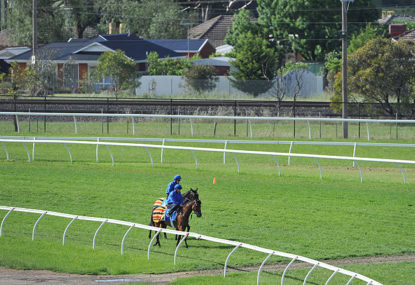TWO GOOD! Zahra wins back-to-back Melbourne Cups on Without a Fight as three horses pull up lame
Without a Fight completed the rare Caulfield Cup-Melbourne Cup double on Tuesday as star jockey Mark Zahra went back-to-back in the big one after…

Among the announcements from Racing Victoria’s increase in prize money announcement was dropping back the share of prize money that a winner collects in races outside Group and Listed-level.
Races without black type currently see the first place winner take 60 per cent of the share of the prize pool.
From the commencement of the 2015/16 season, first place will take 55 per cent – with that five per cent flowing away from the place getters to the finishers further back. Horses placed fourth to 10th will now be better rewarded.
How does that play out?
For a standard country race this season, a winner takes 60% of $15,000 – a $9,000 win.
With the increase in prize money next season, a winner will take 55% of $20,000 – now $11,000. That 5%, or $1,000 that would have been collected by the winner, will be shared by those horses 4th-10th. (The exact breakdown isn’t yet known.)
This is in line with racing in New South Wales, which adopts a similar model across most races.
There isn’t any change for Group races, with races like the Melbourne Cup already lucrative for all runners down to 10th – a 10th placing in the Melbourne Cup pays $125,000.
Initial reactions were mixed – some saying it rewards mediocrity, others pointing to even small amounts of prize money being critical to keep owners in the sport and able to pay bills.
It’s easy to see a USA-style winner take all vs a Scandinavian model of equality argument forming. Indeed, there have been a number of changes to purse distribution in the USA over the years. Prior to the 1970s, finishing worse than fourth didn’t pay a cent, while winners took 65%. Today, it is most akin to Australian racing.
Yet, individual races, states, and tracks still have some variations – the Kentucky Derby pays down to fifth since a change in 2003.
Perspective is important. Owners of top horses will be disappointed that they might earn less owning horses that win more often, while those at the back will be delighted to be getting something back for taking the time and effort to get to the races – and have something to pay the bills.
Racing Victoria haven’t made the change in isolation – combining the ‘hit’ on winners with the boost in prize money.
On the surface, winners still take more money for winning a standard race. In the country race example, it’s $2,000 more from one season to the next.
Should RV have gone further, and distributed money to backmarkers more? Splitting that extra $1000 between seven horses isn’t much more than $125 or so each, although of course that will be more with better races and more in the purse to be dished out.
Ultimately, slow horses cost just as much to keep racing as fast horses, and for racing to be sustainable it can’t just service those with the biggest wallets.
Racing Victoria have left plenty on the table for winning, and more people will get money back for the trouble of investing in what is an expensive hobby.
It’s the right move but is it enough – will it bring in any new owners, or is it more to retain existing owners?